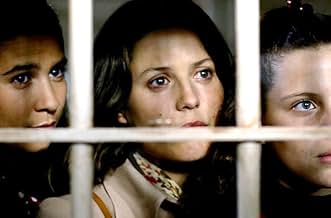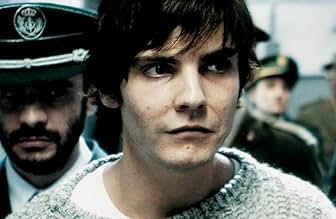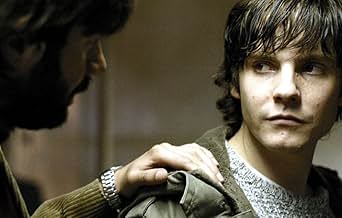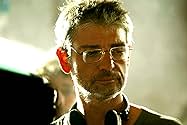IMDb-BEWERTUNG
7,2/10
3505
IHRE BEWERTUNG
Füge eine Handlung in deiner Sprache hinzuA profile of anarchist and bank-robber Salvador Puig Antich, whose 1974 execution under the dictatorship of Francisco Franco ushered in a period of unrest that helped Spain transition to dem... Alles lesenA profile of anarchist and bank-robber Salvador Puig Antich, whose 1974 execution under the dictatorship of Francisco Franco ushered in a period of unrest that helped Spain transition to democracy.A profile of anarchist and bank-robber Salvador Puig Antich, whose 1974 execution under the dictatorship of Francisco Franco ushered in a period of unrest that helped Spain transition to democracy.
- Regie
- Drehbuch
- Hauptbesetzung
- Auszeichnungen
- 16 Gewinne & 22 Nominierungen insgesamt
Biel Duran
- José Luis
- (as Biel Durán)
Empfohlene Bewertungen
This movie is in fact two movies. The first one tells Salvador Puig Antich's life. Explains how he became involved in the resistance against Franco dictatorship and his beginnings in the criminal life. This way, the movie doesn't try to make him look like a saint, because he wasn't, and at the same time justifies him somehow, realistically showing the cruelty and repression that take place in the last years of Franco's life.
The other movie tells Salvador's last 12 hours. The relationship with his family, his friends and his enemies. And his cruel execution. This part is 100% Drama, and very well made one. Its almost 45 minutes of holding tears, jumping from a touching scene to a more touching one. Some of the weak points of the first part are finally justified to help this last devastating dramatization.
The main actors make a great job, specially Leonardo Sbaraglia, Daniel Brühl and Tristán Ulloa. Although the last one sounds a little too weird when he talks Catalan. The main problem of the movie is that the plot isn't thick enough. It tells a simple story of a simple boy and don't get to fully explore the characters minds. But it gets close.
The other movie tells Salvador's last 12 hours. The relationship with his family, his friends and his enemies. And his cruel execution. This part is 100% Drama, and very well made one. Its almost 45 minutes of holding tears, jumping from a touching scene to a more touching one. Some of the weak points of the first part are finally justified to help this last devastating dramatization.
The main actors make a great job, specially Leonardo Sbaraglia, Daniel Brühl and Tristán Ulloa. Although the last one sounds a little too weird when he talks Catalan. The main problem of the movie is that the plot isn't thick enough. It tells a simple story of a simple boy and don't get to fully explore the characters minds. But it gets close.
Historical memory films often tread difficult ground, and Salvador (Puig Antich) does so with uncommon intensity. From the start, Manuel Huerga applies a powerful visual style that gives weight to the story of the Catalan anarchist executed by the Franco regime in 1974. The film doesn't hold back, throwing us directly into his inevitable fate, but before that, it presents Salvador as a human being-one with ideals, flaws, and a life that was taken away without mercy.
Daniel Brühl delivers an exceptional performance, portraying a character who feels alive even in the quietest moments. His evolution throughout the film is brutal, and when the final moments arrive, the anguish he conveys is difficult to shake off. Huerga's direction is another strong point, though the first section, centered on the heists, has a stylized approach reminiscent of Argentine cinema rather than raw realism. Fortunately, once the film shifts focus to the trial and the days leading up to the execution, everything becomes much more visceral, direct, and devastating.
One of the film's greatest achievements is how it avoids empty idealization or forced nostalgia. There are no one-dimensional heroes or villains here-just a story that hurts because it was real and still echoes today. The script masterfully builds tension, making every scene in the final stretch feel like a punch to the gut.
Despite some questionable aesthetic choices in the opening, Salvador is an incredibly powerful film. It doesn't just retell Puig Antich's story-it does so with a sensitivity and precision rarely seen in Spanish cinema. A sharp, unforgiving dose of reality that leaves its mark.
Daniel Brühl delivers an exceptional performance, portraying a character who feels alive even in the quietest moments. His evolution throughout the film is brutal, and when the final moments arrive, the anguish he conveys is difficult to shake off. Huerga's direction is another strong point, though the first section, centered on the heists, has a stylized approach reminiscent of Argentine cinema rather than raw realism. Fortunately, once the film shifts focus to the trial and the days leading up to the execution, everything becomes much more visceral, direct, and devastating.
One of the film's greatest achievements is how it avoids empty idealization or forced nostalgia. There are no one-dimensional heroes or villains here-just a story that hurts because it was real and still echoes today. The script masterfully builds tension, making every scene in the final stretch feel like a punch to the gut.
Despite some questionable aesthetic choices in the opening, Salvador is an incredibly powerful film. It doesn't just retell Puig Antich's story-it does so with a sensitivity and precision rarely seen in Spanish cinema. A sharp, unforgiving dose of reality that leaves its mark.
I was really caught by the story - a story which I didn't know, and which is hardly known outside Spain and even Catalogne, as the director explained in a festival here in Italy where the film was presented. The last years of life of Salvador Puig Antich, the Spanish anarchic activist, who became the last prisoner of the Franchist regime to be executed. The rhythm is fantastic, energetic and dynamic, thanks to a very suggestive photography and the use of vivid images. The music supports the high tone of the events. The last part involves the spectator in a "crescendo" of emotions, slowing down the rhythm while approaching to the inevitable end. No political claims, no moralistic lessons. A well shot, thrilling, emotional movie!
i can't help wondering what the point of this film pamphlet was. it seemed to veer towards naive heroism in the beginning and at the end again, meanwhile completely neglecting a discussion of what set these people apart from other 'normal' terrorists. and then we get a subplot of the last death penalty dealt in Spain with this kid who of course doesn't deserve to be murdered at the hands of the state, but who does really. it fails on this level as well as a level of human relationship, using the story of the guard merely to make a point of how the revolution lives on.
so i felt really ambiguous and detached from the film, which seemed so uncommitted to an involved and deep discussion of its story.
so i felt really ambiguous and detached from the film, which seemed so uncommitted to an involved and deep discussion of its story.
In 1974 the young anarchistic bank-robber Salvador Puig Antich is executed after spending some time in jail. His death starts a period of unrest in Spain, at that time still ruled by the dictator Franco. That unrest is the beginning of democracy in Spain.
This film plays the last months in the life of Salvador. It gives a short insight into his life, his why and what and the choices he makes. It then rolls on to his time in jail and all that follows.
Biographic pictures like this one stand or fall with the capability of the actors to play their real life counterparts convincingly. This film stands. It does a very good job at dramatizing the actual events and left me with a giant lump in my throat.
9 out of 10 accidental heroes.
This film plays the last months in the life of Salvador. It gives a short insight into his life, his why and what and the choices he makes. It then rolls on to his time in jail and all that follows.
Biographic pictures like this one stand or fall with the capability of the actors to play their real life counterparts convincingly. This film stands. It does a very good job at dramatizing the actual events and left me with a giant lump in my throat.
9 out of 10 accidental heroes.
Wusstest du schon
- WissenswertesManuel Huerga chose Daniel Brühl, whose mother is Spanish, to play Salvador because he didn't want to tell a Spanish story, but a universal drama. This was the first time Brühl filmed in Barcelona, his place of birth.
- Zitate
Jesús: They've assassinated Carrero Blanco.
Salvador Puig Antich: That bomb killed me as well.
- VerbindungenEdited from Ogro (1979)
- SoundtracksI si canto trist
Written by Lluís Llach
Performed by Lluís Llach and Miquel Gil
Arranged by Borja Penalba
Produced by Borja Penalba and Xavi Puig
Top-Auswahl
Melde dich zum Bewerten an und greife auf die Watchlist für personalisierte Empfehlungen zu.
- How long is Salvador (Puig Antich)?Powered by Alexa
Details
Box Office
- Weltweiter Bruttoertrag
- 3.445.943 $
- Laufzeit2 Stunden 14 Minuten
- Farbe
- Sound-Mix
- Seitenverhältnis
- 2.35 : 1
Zu dieser Seite beitragen
Bearbeitung vorschlagen oder fehlenden Inhalt hinzufügen

Oberste Lücke
By what name was Salvador - Kampf um die Freiheit (2006) officially released in Canada in English?
Antwort

































